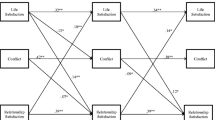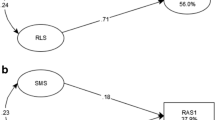Abstract
The present cross-sectional study examined the extent to which ADHD symptomatology moderated the association between emotional intelligence (EI) and relationship satisfaction. A sample of 139 undergraduate students completed self-report measures of ADHD symptomatology, romantic relationship satisfaction, and EI. Hierarchical regression analysis found a significant interaction between emotional intelligence and ADHD symptomatology in their associations with relationship satisfaction while controlling for comorbid depressive symptoms. Simple slopes analyses revealed that EI was positively associated with relationship satisfaction among individuals with higher ADHD symptomatology, but not significantly associated among individuals with lower ADHD symptomatology. These results suggest that EI might play a particularly important role in the relationship quality of individuals with ADHD symptomatology and suggest an important topic for future research.

Similar content being viewed by others
Notes
Three participants were excluded for not completing at least 75 % of the self-report measures.
References
Achenbach, T. M. (1990). Comorbidity in child and adolescent psychiatry: Categorical and quantitative perspectives. Journal of Child and Adolescent Psychopharmacology, 1(4), 271–278.
Aiken, L. S., & West, S. G. (1991). Multiple regression: Testing and interpreting interactions. California: SAGE Publications.
Babinski, D. E., Pelham, W. E., Jr., Molina, B. S., Waschbusch, D. A., Gnagy, E. M., Yu, J., et al. (2011). Women with childhood ADHD: Comparisons by diagnostic group and gender. Journal of psychopathology and behavioral assessment, 33(4), 420–429.
Barkley, R. A. (2006). Primary symptoms, diagnostic criteria, prevalence, and gender differences. Attention-deficit hyperactivity disorder: A handbook for diagnosis and treatment, 3, 76–121.
Barkley, R. A. (Ed.). (2014). Attention-deficit hyperactivity disorder: A handbook for diagnosis and treatment. Guilford Publications.
Barkley, R. A., Murphy, K. R., & Fischer, M. (2010). ADHD in adults: What the science says. New York: Guilford Press.
Biederman, J., Melmed, R. D., Patel, A., McBurnett, K., Konow, J., Lyne, A., et al. (2008). A randomized, double-blind, placebo-controlled study of guanfacine extended release in children and adolescents with attention-deficit/hyperactivity disorder. Pediatrics, 121(1), e73–e84.
Brackett, M. A., Warner, R. M., & Bosco, J. S. (2005). Emotional intelligence and relationship quality among couples. Personal Relationships, 12(2), 197–212.
Bruner, M. R., Kuryluk, A. D., & Whitton, S. W. (2014). ADHD Symptom levels and romantic relationship quality in college students. Journal of American College Health.
Canu, W. H., & Carlson, G. L. (2003). Differences in heterosocial behavior and outcomes of ADHD-symptomatic subtypes in a college sample. Journal of Attention Disorders, 6(3), 123–133.
Fergusson, D. M., & Horwood, L. (1995). Predictive validity of categorically and dimensionally scored measures of disruptive childhood behaviors. Journal of the American Academy of Child and Adolescent Psychiatry, 34(4), 477–487.
Fergusson, D. M., Lynskey, M. T., & Horwood, L. J. (1997). Attention difficulties in middle childhood and psychosocial outcomes in young adulthood. Journal of Child Psychology and Psychiatry, 38, 633–644.
Flory, K., Molina, B. S., Pelham, W. E., Jr., Gnagy, E., & Smith, B. (2006). Childhood ADHD predicts risky sexual behavior in young adulthood. Journal of Clinical Child and Adolescent Psychology, 35(4), 571–577.
Friedman, S. R., Rapport, L. J., Lumley, M., Tzelepis, A., VanVoorhis, A., Stettner, L., et al. (2003). Aspects of social and emotional competence in adult attention-deficit, hyperactivity disorder. Neuropsychology, 17(1), 50.
Funk, J. L., & Rogge, R. D. (2007). Testing the ruler with item response theory: Increasing precision of measurement for relationship satisfaction with the couples satisfaction index. Journal of Family Psychology, 21(4), 572–583. doi:10.1037/0893-3200.21.4.572.
Graham, J. M., Diebels, K. J., & Barnow, Z. B. (2011). The reliability of relationship satisfaction: A reliability generalization meta-analysis. Journal of Family Psychology, 25(1), 39.
Gudjonsson, G. H., Sigurdsson, J. F., Eyjolfsdottir, G. A., Smari, J., & Young, S. (2009). The relationship between satisfaction with life, ADHD symptoms, and associated problems among university students. Journal of Attention Disorders, 12(6), 507–515.
Hinshaw, S. P. (2003). Impulsivity, emotion regulation, and developmental psychopathology: Specificity versus generality of linkages. Annals of the New York Academy of Sciences, 1008(1), 149–159.
Kessler, R., Adler, L., Barkley, R., Biederman, J., Conners, C., Demler, O., et al. (2006). The prevalence and correlates of adult ADHD in the United States: Results from the National Comorbidity Survey Replication. American Journal of Psychiatry, 163(4), 716–723.
Kessler, R. C., Adler, L. A., Barkley, R., Biederman, J., Conners, C. K., Faraone, S. V., et al. (2005). Patterns and predictors of attention-Deficit/Hyperactivity disorder persistence into adulthood: Results from the national comorbidity survey replication. Biological Psychiatry, 57(11), 1442–1451. doi:10.1016/j.biopsych.2005.04.001.
Kristensen, H. A., Parker, J. D., Taylor, R. N., Keefer, K. V., Kloosterman, P. H., & Summerfeldt, L. J. (2014). The relationship between trait emotional intelligence and ADHD symptoms in adolescents and young adults. Personality and Individual Differences, 65, 36–41.
Kroenke, K., & Spitzer, R. L. (2002). The PHQ-9: A new depression diagnostic and severity measure. Psychiatric Annals, 32(9), 509–515.
Levy, F., Hay, D. A., McStephen, M., Wood, C., & Waldman, I. (1997). Attention-deficit hyperactivity disorder: A category or a continuum? Genetic analysis of a large-scale twin study. Journal of the American Academy of Child and Adolescent Psychiatry, 36(6), 737–744.
Lopes, P. N., Brackett, M. A., Nezlek, J. B., Schütz, A., Sellin, I., & Salovey, P. (2004). Emotional intelligence and social interaction. Personality and Social Psychology Bulletin, 30(8), 1018–1034. doi:10.1177/0146167204264762.
Malouff, J. M., Schutte, N. S., & Thorsteinsson, E. B. (2014). Trait emotional intelligence and romantic relationship satisfaction: A meta-analysis. The American Journal of Family Therapy, 42(1), 53–66.
Marsh, L. E., Norvilitis, J. M., Ingersoll, T. S., & Li, B. (2012). ADHD symptomatology, fear of intimacy, and sexual anxiety and behavior among college students in China and the United States. Journal of attention disorders,. doi:10.1177/1087054712453483.
Martel, M. M. (2009). Research Review: A new perspective on attention-deficit/hyperactivity disorder: Emotion dysregulation and trait models. Journal of Child Psychology and Psychiatry, 50(9), 1042–1051.
Martins, A., Ramalho, N., & Morin, E. (2010). A comprehensive meta-analysis of the relationship between emotional intelligence and health. Personality and Individual Differences, 49(6), 554–564.
Mayer, J. D., DiPaolo, M., & Salovey, P. (1990). Perceiving affective content in ambiguous visual stimuli: A component of emotional intelligence. Journal of Personality Assessment, 54(3), 772–781.
Nelis, D., Kotsou, I., Quoidbach, J., Hansenne, M., Weytens, F., Dupuis, P., et al. (2011). Increasing emotional competence improves psychological and physical well-being, social relationships, and employability. Emotion, 11(2), 354.
Neubauer, A. C., & Freudenthaler, H. H. (2005). Models of emotional intelligence. In Emotional intelligence: An international handbook (pp. 31–50).
O’Boyle, E. H., Humphrey, R. H., Pollack, J. M., Hawver, T. H., & Story, P. A. (2011). The relation between emotional intelligence and job performance: A meta-analysis. Journal of Organizational Behavior, 32(5), 788–818.
Overbey, G. A., Snell, W. E., & Callis, K. E. (2011). Subclinical ADHD, stress, and coping in romantic relationships of university students. Journal of Attention Disorders, 15(1), 67–78.
Paulson, J. F., Buermeyer, C., & Nelson-Gray, R. O. (2005). Social rejection and ADHD in young adults: An analogue experiment. Journal of Attention Disorders, 8(3), 127–135.
Petrides, K. V., & Furnham, A. (2001). Trait emotional intelligence: Psychometric investigation with reference to established trait taxonomies. European Journal of Personality, 15(6), 425–448.
Petrides, K. V., Pita, R., & Kokkinaki, F. (2007). The location of trait emotional intelligence in personality factor space. British Journal of Psychology, 98(2), 273–289.
Robin, A. L., & Payson, E. (2002). The impact of ADHD on marriage. The ADHD Report, 10(3), 9–14.
Rooney, M., Chronis-Tuscano, A., & Yoon, Y. (2012). Substance use in college students with ADHD. Journal of Attention Disorders, 16(3), 221–234.
Schutte, N. S., Malouff, J. M., Hall, L. E., Haggerty, D. J., Cooper, J. T., Golden, C. J., et al. (1998). Development and validation of a measure of emotional intelligence. Personality and Individual Differences, 25(2), 167–177.
Shaw-Zirt, B., Popali-Lehane, L., Chaplin, W., & Bergman, A. (2005). Adjustment, social skills, and self-esteem in college students with symptoms of ADHD. Journal of Attention Disorders, 8(3), 109–120.
Smith, L., Heaven, P. C. L., & Ciarrochi, J. (2008). Trait emotional intelligence, conflict communication patterns, and relationship satisfaction. Personality and Individual Differences, 44(6), 1314–1325. doi:10.1016/j.paid.2007.11.024.
Torgersen, T., Gjervan, B., & Rasmussen, K. (2006). ADHD in adults: a study of clinical characteristics, impairment and comorbidity. Nordic Journal of Psychiatry, 60(1), 38–43.
Whisman, M. A. (2013). Relationship discord and the prevalence, incidence, and treatment of psychopathology. Journal of Social and Personal Relationships, 30, 163–170.
Zylowska, L., Ackerman, D. L., Yang, M. H., Futrell, J. L., Horton, N. L., Hale, T. S., et al. (2008). Mindfulness meditation training in adults and adolescents with ADHD a feasibility study. Journal of Attention Disorders, 11(6), 737–746.
Author information
Authors and Affiliations
Corresponding author
Rights and permissions
About this article
Cite this article
Pollock, B.E., Khaddouma, A., Huet-Cox, K. et al. Emotional Intelligence, Relationship Satisfaction, and the Moderating Effect of ADHD Symptomatology. J Adult Dev 24, 15–21 (2017). https://doi.org/10.1007/s10804-016-9242-9
Published:
Issue Date:
DOI: https://doi.org/10.1007/s10804-016-9242-9




